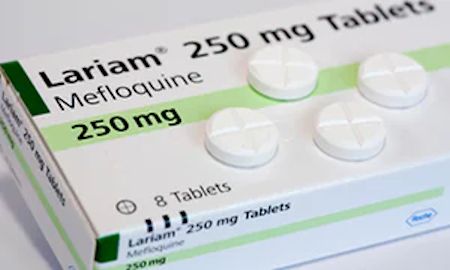
![]()
Lariam
The controversial
antimalarial drug
![]()
Simon Cotton
University of Birmingham
![]()
Molecule of the Month October 2017
Also available: JSMol version.
![]()
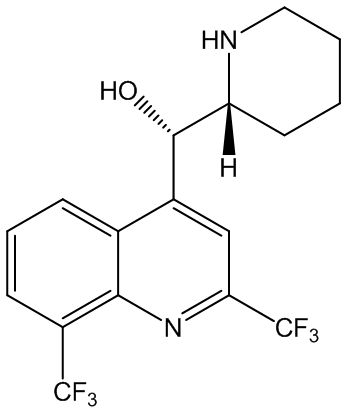
 |
LariamThe controversial
|
 |
No, that's a lariat. Lariam is an antimalarial drug which also goes by the name of mefloquine.
You are getting very warm (like global warming).
Well, quinine (MOTM July 2005) has been used throughout the world to treat malaria for hundreds of years and more. During World War II, much of which was fought in areas subject to malaria, the Western nations were cut off from their normal sources of supply of quinine, and needed huge amounts of antimalarial medication in any case, so resorted to synthetic antimalarial drugs, such as mepacrine and chloroquine. Mepacrine had side-effects (skin and urine turning yellow, and documented cases of toxic psychosis, including Orde Wingate, leader of the Chindits) but chloroquine went on being used well after the war, when chloroquine resistance by malaria parasites in areas of Plasmodium falciparum started to become a problem.
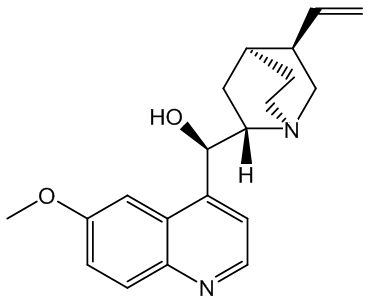 |
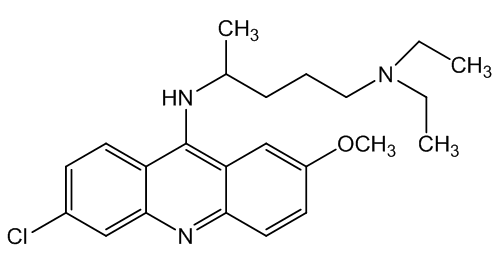 |
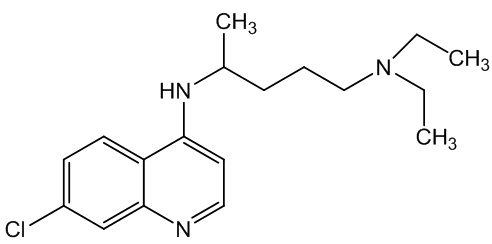 |
| Quinine | Mepacrine | Chloroquine |
Mefloquine arose as a response to this. It features a group resembling the quinoline moiety that is found in quinine and chloroquine too.
 When was mefloquine made?
When was mefloquine made?The Vietnam War began in 1959, and, although American fighting troops did not arrive until 1965, by 1962 it was clear that there were serious chloroquine resistance problems in the area. It has been stated that between 1965 and 1969 there were more than 26,000 acute attacks of falciparum malaria and 53 deaths among US Army personnel in Vietnam, and that over 80,000 cases of malaria were diagnosed in American troops in Vietnam between 1965 and 1971.
A new antimalarial drug was needed, but the pharmaceutical industry was unwilling to develop it, as there would be an insufficient financial return, so the US Army set up a research programme in 1963. They studied some 400 compounds with a 4-quinoline nucleus and an aminoalcohol side-chain, and tested them on mice and monkeys infected with the malaria parasite. The best was WR-142490, later to be known as mefloquine, first synthesised in 1969.
It was originally tested on volunteers in two American prisons in Illinois and Maryland, USA, and then in a number of centres across the world. It produced 100% cure rates against chloroquine-resistant Plasmodium falciparum, which was better than available commercial drugs. In 1979 it was launched by Hofmann-La Roche under the name 'Lariam' and initially proved very successful.
Parallel to this, the North Vietnamese Army was encountering problems with malaria, and appealed to the Chinese for help. The Chinese studied their ancient herbal medicine texts and came up with artemisinin (MOTM May 2013)!
Because there are two asymmetric (‘chiral’) carbon atoms in the molecule, there are two racemic forms, each form having two enantiomers (non-superimposable mirror images that are optical isomers).
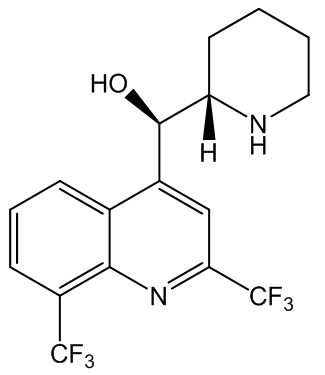 |
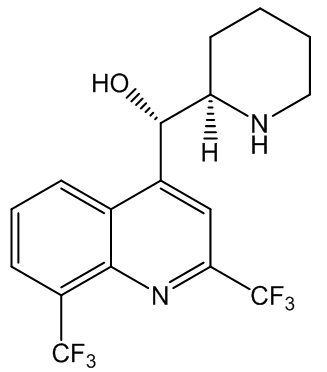 |
| (+)-(11R,12S)-isomer | (-)-(11S,12R)-isomer |
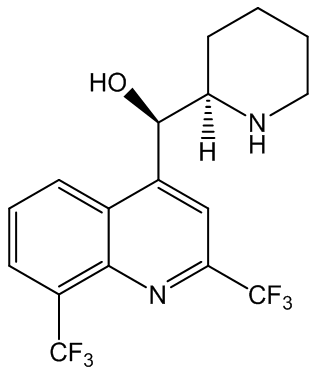 |
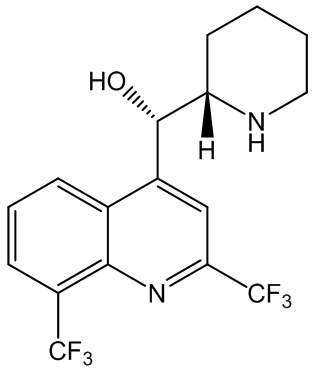 |
| (+)-(11R,12R)-isomer | (-)-(11S,12S)-isomer |
 So what is the problem with mefloquine?
So what is the problem with mefloquine?It works by attacking the malaria parasites within the blood cells and stopping their multiplication, but the precise mechanism is not known. As with other antimalarial medications, gradually resistance became a problem. This has been tackled by using it in combination with other medications, like sulfadoxine-pyrimethamine (MSP) or more recently with artesunate, on the basis that if one drug doesn’t kill the parasite, then the other one will. But that is only part of the story.
There is increasing concern that mefloquine can have dreadful side-effects in a minority of the people who take it. About 10 years ago, a former colleague of mine, a fit and healthy young woman, took it when on holiday abroad; from then on she suffered from epileptic fits.
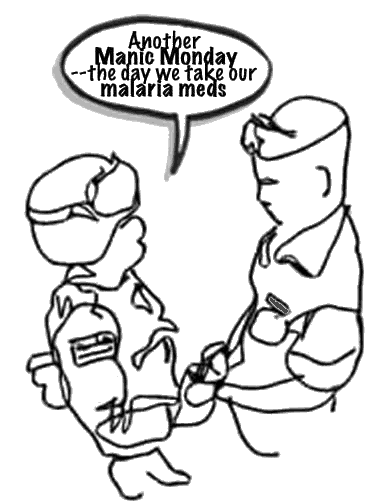 More worrying is the possibility of it having mind-altering effects. An Oxford astrophysicist Steven Rawlings died in January 2012, having suffered a heart attack; he had been pinned to the floor by his oldest friend, Devinderjit Sivia, who had been protecting himself after Rawlings had threatened to kill him, then attacked him. It emerged that Rawlings had had mental health problems since taking mefloquine on holiday in Kenya 15 years earlier.
More worrying is the possibility of it having mind-altering effects. An Oxford astrophysicist Steven Rawlings died in January 2012, having suffered a heart attack; he had been pinned to the floor by his oldest friend, Devinderjit Sivia, who had been protecting himself after Rawlings had threatened to kill him, then attacked him. It emerged that Rawlings had had mental health problems since taking mefloquine on holiday in Kenya 15 years earlier.
In 2002, four US soldiers at Fort Bragg, North Carolina, killed their wives; all had lately returned from duty in Afghanistan, where three of the men had been taking mefloquine. In an even more shocking case in March 2012, Staff Sergeant Robert Bales (photo, right) of the US special forces killed 16 people in two villages in a poor region of Kandahar Province, Afghanistan by shooting or stabbing, setting some of the bodies on fire. He pleaded guilty in court, saying to the judge: “There’s not a good reason in this world for why I did the horrible things I did”. Bales was sentenced to life imprisonment, without parole. It has not been confirmed that Bales was given mefloquine on this tour of duty, though he is reported to have taken it on previous deployments.
A US sailor suffering from uncontrolled anger, insomnia, nightmares and memory loss and initially diagnosed with post-traumatic stress disorder was later found to have brain damage ascribed to mefloquine, which he had been given on his deployment to Africa in late 2009.
The US Army used mefloquine with its Special Forces until 2013 when they discontinued its use. The French Army has never used mefloquine, but the British Army still – controversially - does.
Product information for this medication indicates that mefloquine "should not be prescribed for prophylaxis in patients with active depression, a recent history of depression, generalized anxiety disorder, psychosis, or schizophrenia or other major psychiatric disorders, or with a history of convulsions", which amounts to 9–10% of the population. It is an effective medication, but clearly care needs to be taken before it is prescribed. Clearly, it cannot be a ‘one-size-fits-all’ approach to the problem of malaria.
![]()
![]()
![]() Back to Molecule of the Month page. [DOI:10.6084/m9.figshare.5458585]
Back to Molecule of the Month page. [DOI:10.6084/m9.figshare.5458585]